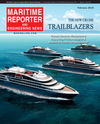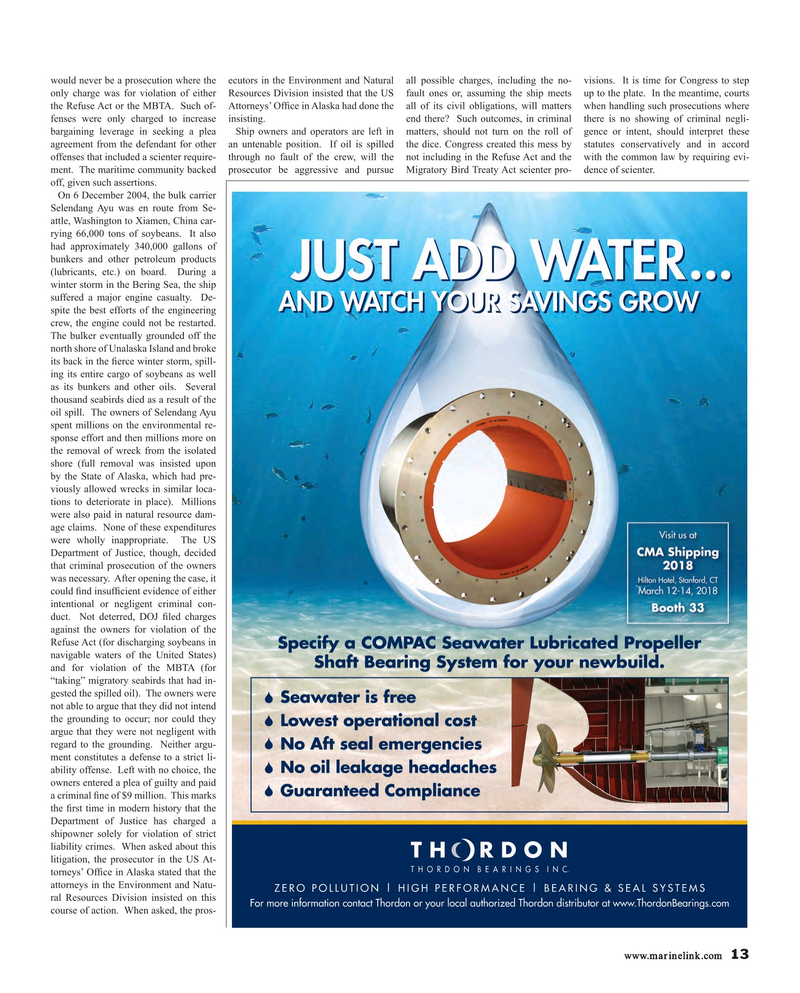
Page 13: of Maritime Reporter Magazine (February 2018)
Cruise Ship Annual
Read this page in Pdf, Flash or Html5 edition of February 2018 Maritime Reporter Magazine
would never be a prosecution where the ecutors in the Environment and Natural all possible charges, including the no- visions. It is time for Congress to step only charge was for violation of either Resources Division insisted that the US fault ones or, assuming the ship meets up to the plate. In the meantime, courts the Refuse Act or the MBTA. Such of- Attorneys’ Of? ce in Alaska had done the all of its civil obligations, will matters when handling such prosecutions where fenses were only charged to increase insisting. end there? Such outcomes, in criminal there is no showing of criminal negli- bargaining leverage in seeking a plea Ship owners and operators are left in matters, should not turn on the roll of gence or intent, should interpret these agreement from the defendant for other an untenable position. If oil is spilled the dice. Congress created this mess by statutes conservatively and in accord offenses that included a scienter require- through no fault of the crew, will the not including in the Refuse Act and the with the common law by requiring evi- ment. The maritime community backed prosecutor be aggressive and pursue Migratory Bird Treaty Act scienter pro- dence of scienter.
off, given such assertions.
On 6 December 2004, the bulk carrier
Selendang Ayu was en route from Se- attle, Washington to Xiamen, China car- rying 66,000 tons of soybeans. It also had approximately 340,000 gallons of bunkers and other petroleum products (lubricants, etc.) on board. During a winter storm in the Bering Sea, the ship suffered a major engine casualty. De- spite the best efforts of the engineering crew, the engine could not be restarted.
The bulker eventually grounded off the north shore of Unalaska Island and broke its back in the ? erce winter storm, spill- ing its entire cargo of soybeans as well as its bunkers and other oils. Several thousand seabirds died as a result of the oil spill. The owners of Selendang Ayu spent millions on the environmental re- sponse effort and then millions more on the removal of wreck from the isolated shore (full removal was insisted upon by the State of Alaska, which had pre- viously allowed wrecks in similar loca- tions to deteriorate in place). Millions were also paid in natural resource dam- age claims. None of these expenditures were wholly inappropriate. The US
Department of Justice, though, decided that criminal prosecution of the owners was necessary. After opening the case, it could ? nd insuf? cient evidence of either intentional or negligent criminal con- duct. Not deterred, DOJ ? led charges against the owners for violation of the
Refuse Act (for discharging soybeans in navigable waters of the United States) and for violation of the MBTA (for “taking” migratory seabirds that had in- gested the spilled oil). The owners were not able to argue that they did not intend the grounding to occur; nor could they argue that they were not negligent with regard to the grounding. Neither argu- ment constitutes a defense to a strict li- ability offense. Left with no choice, the owners entered a plea of guilty and paid a criminal ? ne of $9 million. This marks the ? rst time in modern history that the
Department of Justice has charged a shipowner solely for violation of strict liability crimes. When asked about this litigation, the prosecutor in the US At- torneys’ Of? ce in Alaska stated that the attorneys in the Environment and Natu- ral Resources Division insisted on this course of action. When asked, the pros- www.marinelink.com 13
MR #2 (10-17).indd 13 MR #2 (10-17).indd 13 2/8/2018 9:24:51 AM2/8/2018 9:24:51 AM

 12
12

 14
14
